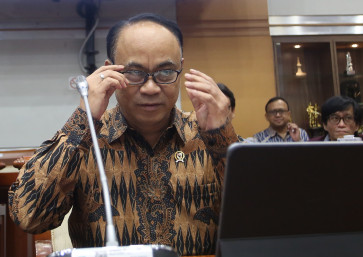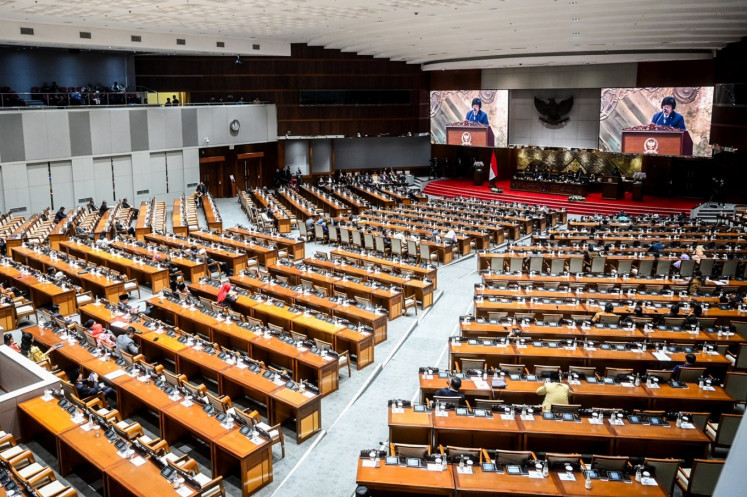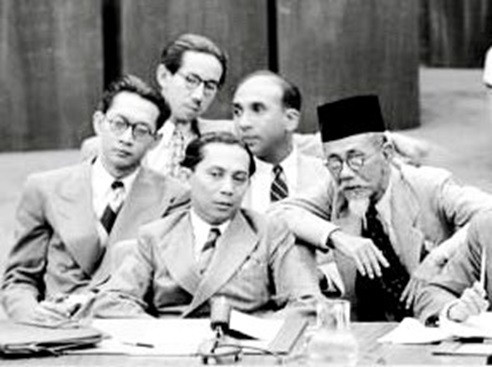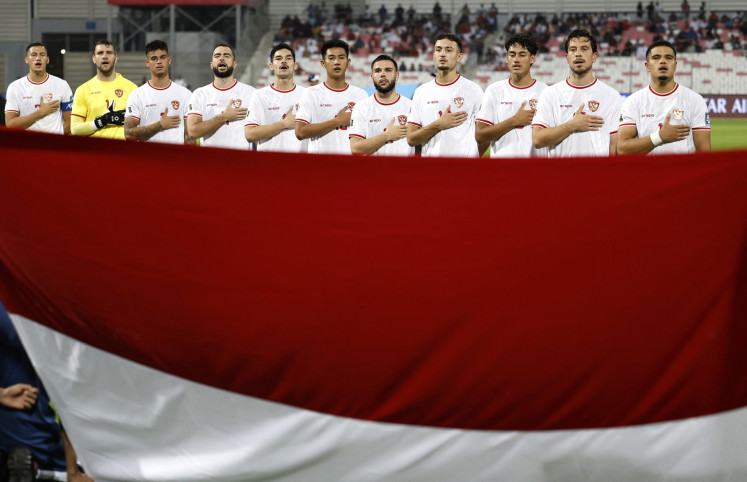IPPP: Another foundation for stronger cooperation with the Pacific
Both Indonesia and Pacific countries share many of the same challenges in the Pacific, particularly in terms of climate-related disasters that plague Pacific nations, and have developed mitigation strategies and systems that could easily be implemented across the Pacific.
Change text size
Gift Premium Articles
to Anyone
 Foreign Minister Retno Marsudi (front center) and ministers, senior officials and representatives from Pacific countries and intergovernmental organizations pose for a group photo during the Indonesia-Pacific Forum for Development High Level Dialogue on Dec. 7, 2022, in Nusa Dua, Bali. (JP/A. Muh. Ibnu Aqil)
Foreign Minister Retno Marsudi (front center) and ministers, senior officials and representatives from Pacific countries and intergovernmental organizations pose for a group photo during the Indonesia-Pacific Forum for Development High Level Dialogue on Dec. 7, 2022, in Nusa Dua, Bali. (JP/A. Muh. Ibnu Aqil)
O
ne month before the 53rd Pacific Islands Forum (PIF) Leaders’ Meeting in Tonga, Indonesia will host the second meeting of the Indonesia-Pacific Parliamentary Pacific Partnership (IPPP), on July 25-26 in Jakarta.
Thanks to the Indonesian House of Representatives, the IPPP has instituted a unique yet notable mode of high-level engagement between Indonesia and the Pacific. The House is indeed one of the main pillars of democracy mutually shared by Indonesia and the Pacific.
As a middle power in the world landscape ripe with geopolitical rivalries, Indonesia rightly promotes a different path of engagement by bridging divides, providing solutions and building open, inclusive, transparent and equitable regional architecture.
Not only can Indonesia reduce the space for rivalries but it can also help refocus the partnership in meeting development goals and needs as defined and owned by the Pacific Islands Countries (PICs) notably through the 2050 Strategy for the Blue Pacific Continent.
As the theme of the meeting, Partnership for Prosperity: Fostering Regional Connectivity and Inclusive Development, suggests, Indonesia’s commitment to serve as a bridge between Southeast Asia and the Pacific should continue.
Through the ASEAN Outlook on the Indo-Pacific, ASEAN may also develop cooperation with the PIF and other subregional mechanisms in the Pacific on areas of common interests and initiatives.
Furthermore, under Indonesia’s chairmanship of ASEAN in 2023, both secretariats of ASEAN and PIF inked a strong commitment to work together for the interests of both regions by sharing diverse experiences and helping transform their respective societies.
It is high time these commitments are implemented. It is a reminder to us all that commitments and strategies can be adopted and declared but their sustained implementation in a fluid dynamic environment like the Pacific is key to their success.
Why then, is the second meeting of the IPPP a strategic avenue for Indonesia and the PICs to address shared developmental concerns while navigating the unavoidable ocean of rivalries in the Pacific?
Parliaments and parliamentarians play a pivotal role in the governance of their respective countries. As second-track diplomacy, parliaments and parliamentarians have proven their diplomatic role, such as through the International Parliamentary Union.
The speaker of Fiji’s parliament, Hon. Ratu Naiqama Lalabalavu, correctly stated that “the role of parliamentary diplomacy is crucial for building bridges toward peace and understanding between nations”.
What can Indonesia offer through this August meeting?
Indonesia can translate its position as a strong and reliable development partner for fellow Pacific nations as many economies in the Asia-Pacific will be missing the 2030 target year and are lagging behind other regions in attaining the Sustainable Development Goals (SDGs).
First, it is easy to forget that Indonesia is the world's fourth-most populous country and the third-largest democracy, with the largest archipelago. Proud of its robust and homegrown system of democracy, Indonesia has championed the Bali Democracy Forum since 2008 as a space to help create strong democratic architecture and practice in the region.
Second, Indonesia is not only one of the fastest-growing economic powerhouses in the world, but its cultural and geographical similarities and ties to the Pacific nations make for efficient technical expertise provisions in various industries like agriculture, technology, education and even the media.
Both Indonesia and Pacific countries share many of the same challenges in the Pacific, particularly in terms of climate-related disasters that plague Pacific nations, and have developed mitigation strategies and systems that could easily be implemented across the Pacific. Engaging communities, coupled with the knowledge of similar challenges, bodes well for inclusive development, as the theme of the second IPPP suggests.
Indonesia is a market of almost 280 million people for products that can be marketed and developed together including through joint ventures among small and medium enterprises (SMEs). The IPPP itself focuses on several crucial areas, all aimed at enhancing regional cooperation and sustainable development. These include partnerships for prosperity, regional connectivity, inclusive development, maritime potential and managing climate change impacts.
With this connection, I fully agree with the statement of the director general of the Melanesian Spearhead Group (MSG) Secretariat, Leonard Louma, to envision “MSG as the foundation and the building block for Pacific regionalism”. Thus, initiating subregional economic corridors and relations and tapping into the unlimited potentials of Indonesia and MSG countries is an idea worth pursuing.
The fostering of inter-parliamentary cooperation toward building resilient communities aims to go beyond mitigating the adverse effects of climate change, such as building a more resilient health sector to meet the challenges of events such as global pandemics.
Indonesia has been a friend and partner to the Pacific for decades, a relationship built on trust and mutual respect. Indonesia’s comprehensive strategies and undertakings would indeed increase its support even more in the future.
Enhanced inter-parliamentary cooperation is vital not only for increasing Indonesia’s efforts as a development partner but also for strengthening regional resilience and promoting inclusive development.
That way the second meeting of the IPPP can help realize the ocean of the Pacific as an ocean of peace, an ocean of collaboration and an ocean of development for all the people of the Blue Pacific Continent who have been waiting tirelessly for the democratic dividends, for more prosperous, resilient and peaceful lives.
***
The writer is Indonesian ambassador to Fiji, Kiribati, Nauru and Tuvalu based in Suva. The views expressed are his own.










